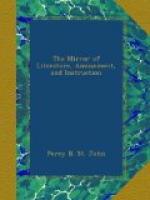as he staked but a single life, was thought such an
unfair war, that, instead of honouring his desperate
valour, our men, to punish him, cut off his croix
de St. Louis before they sent him to the hospital.
Two of our officers, however, signed a certificate
of his courage, lest the French should punish him as
corrupted—our enterprises, unless facilitated
by corruption, being deemed impossible to have taken
place. Day-break discovered our forces in possession
of the eminence. Montcalm could not credit it
when reported to him—but it was too late
to doubt, when nothing but a battle could save the
town. Even then he held our attempt so desperate,
that being shown the position of the English, he said,
“Oui, je les vois ou ils ne doivent pas etre.”
Forced to quit his intrenchments, he said, “S’il
faut done combattre, je vais les ecraser.”
He prepared for engagement, after lining the bushes
with detachments of Indians. Our men according
to orders, reserved their fire with a patience and
tranquillity equal to the resolution they had exerted
in clambering the precipice—but when they
gave it, it took place with such terrible slaughter
of the enemy, that half an hour decided the day.
The French fled precipitately, and Montcalm, endeavouring
to rally them, was killed on the spot. General
Monckton was wounded early, and obliged to retire.
The fall of Wolfe was noble indeed. He received
a wound in the head, but covered it from his soldiers
with his handkerchief. A second ball struck him
in the belly, that too he dissembled. A third
hitting him in the breast, he sunk under the anguish,
and was carried behind the ranks. Yet, as fast
as life ebbed out, his whole anxiety centred on the
fortune of the day. He begged to be borne nearer
to the action; but his sight being dimmed by the approach
of death, he entreated to be told what they who supported
him saw; he was answered that the enemy gave ground.
He eagerly repeated the question, heard the enemy
was totally routed, cried, “I am satisfied!”—and
expired—
Thackeray’s Life of the
Earl of Chatham.
* * * *
*
SYRIAN LOOKING GLASSES.
The Damascus blades are the handsomest and best of
all Syria; and it is curious to observe their manner
of burnishing them. This operation is performed
before tempering, and they have for this purpose a
small piece of wood, in which is fixed an iron, which
they run up and down the blade, and thus clear off
all inequalities, as a plane does to wood: they
then temper and polish it. This polish is so highly
finished, that when any one wants to arrange his turban,
he uses his sword for a looking-glass. As to
its temper it is perfect, and I have nowhere seen
swords that cut so excellently. There are made
at Damascus and in the adjoining country mirrors of
steel, that magnify objects like burning-glasses.
I have seen some that, when exposed to the sun, have
reflected the heat so strongly as to set fire to a
plant fifteen or sixteen feet distant!—Broquiere’s
Travels to Jerusalem in 1432.




